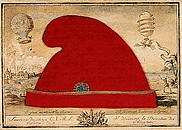Thomas Paine, la gauche et les historiens conservateurs En ligne
Article de Sean Monahan, "Reading Paine from the left", publié dans le Jacobin Magazine le 6 mars 2015 et signalé sur le site de la Thomas Paine National Historical Association. Voir également sur ce site la réponse de Gary Berton au texte de J. C. D. Clark publié dans le Times Literary Supplement du 16 septembre 2015, dans lequel Clark, héritier de la tradition hostile à Paine, s'efforce une nouvelle fois de le dépeindre en auteur mineur abusivement considéré comme un philosophe par les courants progressistes. Début de l'article de Sean Monahan :
When Thomas Paine passed away at his small farm in New Rochelle, NY, in 1809, he was impoverished and largely reviled.
In the United States, then undergoing a dramatic religious revival, he was slandered as an “infidel” and a “drunk” for his attacks on Christianity and his rumored personal moral depravity. This, on top of his tirades against George Washington, the Federalists, and slavery, had decimated his reputation in the country he helped found.
Across the Atlantic, Paine was condemned as a traitor to the Crown and a dangerous rabble-rouser for his passionate defense of the French Revolution in The Rights of Man, convicted in absentia for seditious libel, and burned in effigy throughout Britain. No single person was seen as a greater threat to the political establishments of his day than Paine, both in the monarchies of Europe and in his own American Republic.
As a cult of personality around the “Founding Fathers” grew over the course of US history, the author of Common Sense was notably excluded. For about two hundred years, Paine’s image in mainstream American circles was utterly tarnished: Teddy Roosevelt’s view of him as a “filthy little atheist” sums up the prevailing sentiment. It’s no surprise that decades earlier Abraham Lincoln kept his admiration of Paine quiet.
Lire la suite sur le Jacobin Magazine

